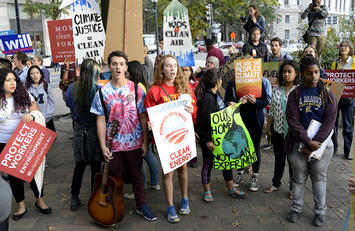
The political allegiances of America’s youngest generation, Gen Z, are up for grabs these days. Younger Americans are politically disengaged, rejecting ideological extremism, and want to move beyond commonplace political platitudes.
I learned this important lesson this fall, while teaching at a college and regularly visiting dozens of other colleges and universities around the country.
Each time, when I arrive at a campus I feel none of the anticipation and energy which used to precede presidential elections. For example, in the months leading up to the 2016 election, there was palpable excitement – mostly on the left – about a better American future. By comparison today, in advance of the 2020 election, that enthusiasm is all but gone.
It appears that earlier zeal has been replaced with a sense of extreme political dislocation; there is seemingly little trust in others, less political chatter compared to older generations, and most students are rejecting both liberal and conservative worldviews.
Data from AEI’s new “Survey on Community and Society” show that America’s cohort of 18-22 year olds — the current adult component of those who make up Gen Z — feel fairly powerless when it comes to political change, and identify with more moderate positions than either those on the left or the right. This suggests that members of Gen Z are searching for something else, presenting an opportunity to whichever party is bold enough to cultivate and capture this growingly powerful demographic group.
The findings of the AEI survey demonstrate that Gen Zers feel less politically effective than older generations today. When asked if ordinary citizens can do much to influence the government in Washington if they are willing to make an effort, only 41 percent of these younger Americans believe that they can do so. In contrast, 55 percent of those 65 and older — those who are in the early baby boomer cohort — believe that they can exert influence. Similarly, just 18 percent of Generation Zers feel that holding elections makes the government pay attention to what the people think “a good deal of the time” or more often, compared to 30 percent of the early boomer cohort or those who are 65 and older. With such low numbers, it is no wonder there is little excitement for the 2020 election on campuses today.
Compared to older generations, younger Americans today are less engaged in political life, and the appreciable differences in political discourse is strong evidence. Just 47 percent of college-age Gen Z Americans report having discussed politics or current affairs at least once a week. By contrast, 58 percent of 65 or older respondents talk politics weekly. This is a disturbing trend: political discourse is a benchmark of a healthy polity and vibrant civil society.
When talk declines, so does general trust and the social bonds of society. The data show that younger Americans are quite mistrusting of others. Sixty percent of American Gen Zers believe that others would take advantage of them (vs 31 percent for older boomers). This extremely pessimistic worldview differs significantly from older boomers; 67 percent of whom believe that others would try to be fair. This gap definitely points to an engagement issue with the younger generation now on campus.
The data also reveal that the often claimed ideological liberalism of 18 to 22 year-old Americans is overstated and this is the case for those both in and out of college. Given the significant number of those with college degrees or are in college, it is reasonable to anticipate greater numbers of liberal identifiers and 31 percent of this group identify as very or extremely liberal while just 6 percent identify as very or extremely conservative. But 63 percent identify as something else; 31 percent are moderates, 16 percent lean in one direction, and another 16 percent have not given politics much thought. These figures make it quite clear that this is not a liberal monoculture at all; significant numbers cluster in the middle, are politically open and fairly disconnected, and are not on the liberal extreme whatsoever.
Given these traits, a tremendous opportunity exists for whichever party can organize itself through this current chaos and speak directly to Gen Zers. While Gen Zers generally identify more with Democrats than Republicans, party labels are misleading as citizens habitually have to choose between two less than ideal partisan extremes. Moreover, others have also noticed that Gen Zers are more conservative than many realize and that Democrats should not take their allegiance for granted. The AEI data suggest that if one party can reach and be responsive to Gen Zers — by helping younger Americans find their voice and show them how to matter — a longer term, robust relationship could develop. The question now is whether either party can muster the leadership, discipline, and vision to take advantage of this opening and work with this growingly powerful generation.
This article previously appeared at aei.org.
Photo credit: Stephen Melkisethian via Flickr under CC 2.0 License.
Samuel J. Abrams is a visiting scholar at American Enterprise Institute, where he focuses on questions of related civic and political culture and American ideologies. He is concurrently a professor of politics and social science at Sarah Lawrence College, and a faculty fellow with New York University’s Center for Advanced Social Science Research. Dr. Abrams has been widely published in The New York Times, The Washington Post, The American Interest, and The Chronicle of Higher Education, among others. He is also the author of several books on a variety of topics including public opinion, Congress, religion and society, and polarization.












